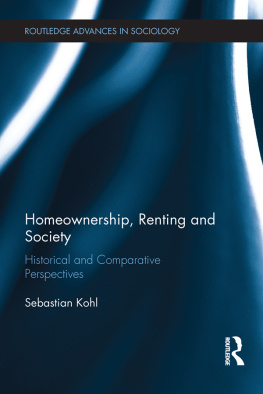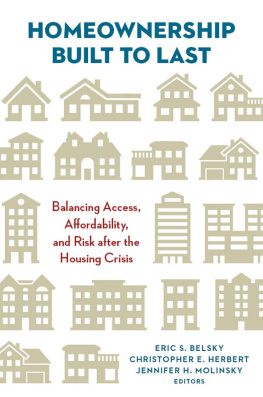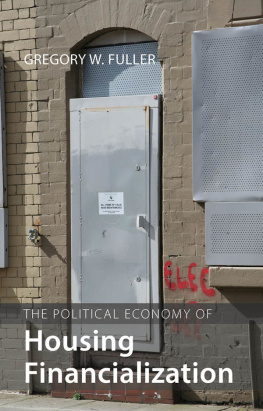Homeownership, Renting and Society
It is well known that the US has a much higher homeownership rate than Germany. Cultural, land scarcity and welfare state explanations have been mobilized to explain the difference. Sebastian Kohl rejects such explanations and comes up with three explanations rooted in nineteenth century developments: differencesin municipal governance over land use, mortgage lending institutions and the organization of residential construction.
Manuel B. Aalbers, Associate Professor of Geography at KU Leuven, Belgium
On the eve of the financial crisis, the USA was inhabited by almost 70 percent homeowning households, in comparison to about 45 percent in Germany. Homeownership, Renting and Society presents new evidence showing that this homeownership gap already existed between American and German cities around 1900. Existing explanations based on culture, government housing policy or typical socio-economic factors have difficulties in accounting for these long-term cross-country differences.
Using historical case studies on Germany and the USA, the book identifies three institutional domains on the supply-side of the housing market urban land, housing finance and construction that set countries on different housing trajectories and subsequently established differences that were hard to reverse in later periods. Further chapters generalize the argument across other OECD (Organisation for Economic Co-operation and Development) countries and extend the explanation to cover historical differences in homeownership ideology and horizontal property institutions. This enlightening volume also puts forward path-dependence theories in housing studies, connects housing with vast urban-history and political-economy literature and offers comprehensive insights about the case of a tenants country which contradicts the tendency towards universal homeownership.
Providing an all-new historic-institutionalist explanation of the GermanAmerican homeownership gap, this title will be of interest to postgraduate students and scholars interested in fields including: Housing Studies, Sociology, Urban History, Political Economy, Social Policy and Geography. It may also be of interest to those working in housing field organizations and ministries.
Sebastian Kohl is a researcher at the Institute for Housing and Urban Research, Uppsala University, Sweden.
Routledge Advances in Sociology
For a full list of titles in this series, please visit www.routledge.com/series/SE0511.
Humanist Realism for Sociologists
Terry Leahy
The Third Digital Divide
A Weberian Approach to Digital Inequalities
Massimo Ragnedda
Alevis in Europe
Voices of Migration, Culture and Identity
Edited by Tzn Issa
On the Frontlines of the Welfare State
Barry Goetz
WorkFamily Dynamics
Competing Logics of Regulation, Economy and Morals
Edited by Berit Brandth, Sigtona Halrynjo and Elin Kvande
Class in the New Millennium
Structure, Homologies and Experience in Contemporary Britain
Will Atkinson
Racial Cities
Governance and the Segregation of Romani People in Urban Europe
Giovanni Picker
Bourdieusian Prospects
Edited by Lisa Adkins, Caragh Brosnan and Steven Threadgold
Alienation and Affect
Warren D. TenHouten
Homeownership, Renting and Society
Historical and Comparative Perspectives
Sebastian Kohl
Social Class and Transnational Human Capital
How Middle and Upper Class Parents Prepare Their Children for Globalization
Jrgen Gerhards, Silke Hans and Sren Carlson
Love and Society
Special Social Forms and the Master Emotion
Swen Seebach
Homeownership, Renting and Society
Historical and Comparative Perspectives
Sebastian Kohl
First published 2017
by Routledge
2 Park Square, Milton Park, Abingdon, Oxon OX14 4RN
and by Routledge
711 Third Avenue, New York, NY 10017
Routledge is an imprint of the Taylor & Francis Group, an informa business
2017 Sebastian Kohl
The right of Sebastian Kohl to be identified as author of this work has been asserted by him in accordance with sections 77 and 78 of the Copyright, Designs and Patents Act 1988.
All rights reserved. No part of this book may be reprinted or reproduced or utilized in any form or by any electronic, mechanical, or other means, now known or hereafter invented, including photocopying and recording, or in any information storage or retrieval system, without permission in writing from the publishers.
Trademark notice: Product or corporate names may be trademarks or registered trademarks, and are used only for identification and explanation without intent to infringe.
British Library Cataloguing in Publication Data
A catalogue record for this book is available from the British Library
Library of Congress Cataloging in Publication Data
A catalog record for this book has been requested
ISBN: 978-1-138-64494-6 (hbk)
ISBN: 978-1-315-62845-5 (ebk)
Typeset in Times New Roman
by Wearset Ltd, Boldon, Tyne and Wear
Contents
It is not uncommon to mention and thank the institutions and people relevant in the creation of the chapters in this volume. This is the purpose of the following words. The origins of this book reach back to my thesis submitted in Cologne and Paris in 2014. I would therefore like to thank first and foremost my supervisors and reviewers Jens Beckert, Pierre Franois, Patrick Le Gals and Martin Hpner as well as Leonard Seabrooke for their supervision, and the Max Planck Institute for the Study of Societies (MPIfG) directed by Wolfgang Streeck and Jens Beckert as well as the Centre de Sociologie des Organisations (CSO) under Christine Musselin. Thanks also to the Franco-German University for financial and institutional support. I have profited from the support of the Institute for Housing and Urban Research in Uppsala and the Nordic housing community during the process of creating a book out of my PhD.
For advice concerning literature and data sources, for comments and proofreading I would furthermore like to thank the following: participants of the Copenhagen Shelter or Storm workshop and the Cologne Mieternation Deutschland IW workshop, of the MaxPo Economic Moralities graduate conference and the ENS Seminaire logement, former members of the doctoral staff at the MPIfG, in particular Daniel Mertens, Lukas Haffert, Timur Ergen and Barbara Fulda, and the CSO, in particular Damien Krichewsky, Hugo Bertillot, Pascal Braun, Simon Paye, Teis Hansen, Michael Voigtlnder, Claire Lemercier, Jrgen Friedrichs, Patrik Aspers, Philip Korom, Francesco Boldizzoni, Michael Hochgeschwender, Michael McCarthy, Jeremy Ferwerda, David Gosselin, Sebastian Rojek, Cline Vaz, Emilia Bompadre, Kerstin Konkol, Gertjan Wijburg and Isabel Pato.
In the Scandinavian context, the book profited from the seminars at the Institute for Housing and Urban Research and Uppsala University. I am indebted to Jim Kemeny to whom I not only owe the question to which my book aspires to be a new answer, but who also encouraged me to look at housing ideologies (see of this book were awarded the Bengt-Turner Award. Participants from the MPIfG securitization workshop 2016, particularly Manuel Aalbers and Ewald Engelen, were helpful. Special thanks go to the library employees of the MPIfG, to Pratik Mishra for gathering together many data and to Anna-Riikka Kauppinen. The original thesis won two best dissertation prizes, the first awarded by the French-German University (financed by the Rotary Clubs Paris and Berlin/Brandenburg), the second by the German Real Estate University. The symbolic and financial recognition was helpful along the way.










